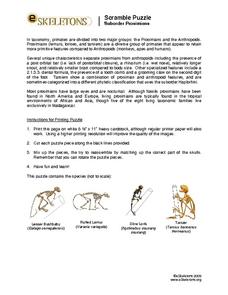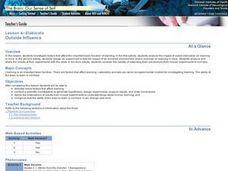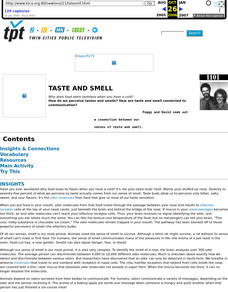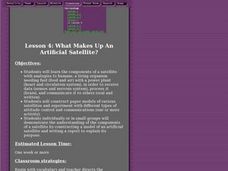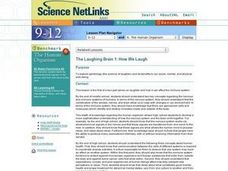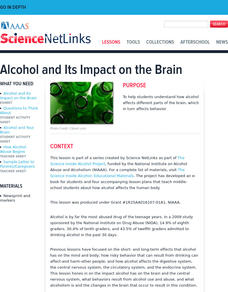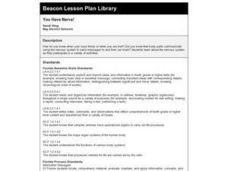Green Education Foundation
How Loud is Too Loud?
Ever wonder how loud a sound has to be to cause damage? Young scientists explore sound properties by researching decibel levels. They discuss how sound is perceived by our ears and our brains and why it can cause negative health effects...
eSkeletons
Skeleton Scramble Puzzle: Suborder Prosimians
Explore the finer details of primate skulls with these puzzles, incorporating advanced scientific analysis of two suborders- Prosimians and Anthropoidea- and one superfamily- Hominoidea. Learners read about the unique characteristics of...
University of Minnesota
Connect the Neurons!
Create a neuron frenzy as your pupils play the part of the neurons. An engaging lesson creates a human chain of neurons that pass cotton balls posing as neurotransmitters. Scholars learn about pre- and post-synapses as they complete the...
Curated OER
Anatomy
Third graders explore the basic structures and functions of the human body and how they relate to personal health.
Curated OER
OUtside Influence
Students identify factors that are important for brain functioning of learning. They observe the impact of interaction in mice. They also create their own experiment dealing with the mice. They analyze and share their results.
Curated OER
Taste and Smell
Students experiment to determine classmates taste and smell to find out which sends the clearest message to the brain.
Curated OER
Crossword Puzzle - Parts of the Body
In this crossword puzzle worksheet, students use the clues to complete the crossword puzzle with words about the human body. Students complete 10 clues.
Curated OER
The Nervous System Lesson
Students identify features of the nervous system. They explore the needs of the human body by explaining the importance of good health in relationship to the body and explain the functions and care of the human body and its organs.
Curated OER
The Real Bionic Man
High schoolers examine the work that scientists have been doing to create artificial human parts. For this exploratory lesson students research the human eye and brain using the Internet.
Curated OER
What Makes Up An Artificial Satellite?
Students discover the components of a satellite using analogies to humans in a class discussion and participate in an activity in which they construct a paper model of a satellites and experiment with different types of attitude control...
Curated OER
Primate Evolution
In this primate evolution worksheet, learners use a diagram showing different primate adaptations to complete 3 short answer questions comparing human traits and primate traits.
Curated OER
Making Connections: Exploring Our Brains through the Five Senses
Young scholars record observations and create drawings and models of anatomy using their five senses. They describe the structures of a neuron and analyze each of their functions. They compare and contrast the typical structural...
Curated OER
The Effects of "Recreational" Drugs on the Development of Chick Embryos as a Model for Human Embryogenesis
Students conduct experiments on fertilized chicken embryos to determine the possible developmental effects that various recreational drugs (caffeine, alcohol, nicotine, and aspirin) might have on them.
Curated OER
GED Vocabulary: Life Science
In this life science GED learning exercise, students complete a crossword puzzle given 9 clues about structures of the nervous system, the circulatory system, evolution, the digestive system, molecules and fossils. Students are given a...
Scholastic
Study Jams! The Senses: Smelling
It makes sense to sniff out a good lesson on the sense of smell. Here is a six-slide presentation that can be a strong component to that lesson! With photographs and expository graphics, life scientists find that smell is the detection...
Curated OER
Pieces of Mind: Remembering What Matters
Pupils watch the program "Pieces of Mind" from PBS and participate in a class discussion about PET scans and their advantages. Students then brainstorm activities a PET scan could be used for.
Curated OER
The Human Organism
Eighth graders investigate animal behavior by studying the lives of three female behavior scientists. In this human organism lesson students do different activities that inquire and approach each females work.
Curated OER
The Laughing Brain 1: How We Laugh
Young scholars to rate themselves on a scale from 1 to 10 (10 being the happiest) as to how happy they feel and write their rating on a sheet of paper. They explore gelotology (the science of laughter) and its benefits to our social,...
Curated OER
Central Nervous System Study Questions
In this central nervous system worksheet, students define 24 terms associated with the human central nervous system. They answer 28 short answer questions dealing with the structures and function of the CNS.
Curated OER
Mapping the Homunculus
Young scholars determine the relative number of nerve endings located in the skin. By calculating the reciprocal of these measurements, students have the appropriate data for predicting the relative size of the homunculus found on the...
Curated OER
Alcohol and Its Impact on the Brain
Students examine water as it changes states. In water and ice lesson students study the water cycle and what happens to it as it changes state.
Curated OER
Systems of the Human Body
Students play an interactive activity and answer questions about body systems.
Curated OER
You Have Nerve!
Fourth graders investigate the nervous system and how it communicates messages to and from the brain.
Curated OER
Neuroscience for Kids
In this neuroscience worksheet, students explore the Neuroscience for Kids website and then complete the questions. Students compare axons and dendrites, the central, peripheral, and autonomic nervous system, and the different lobes of...
Other popular searches
- Human Brain Anatomy
- The Human Brain
- Human Brain Diagram
- Human Brain Lessons
- Human Brain Grade 5
- Human Brain Outlines
- Human Brain Worksheets
- Sheep Brain Human Brain
- Human Brain Versus Sheep
- Parts of the Human Brain
- Science the Human Brain
- +The Human Brain



